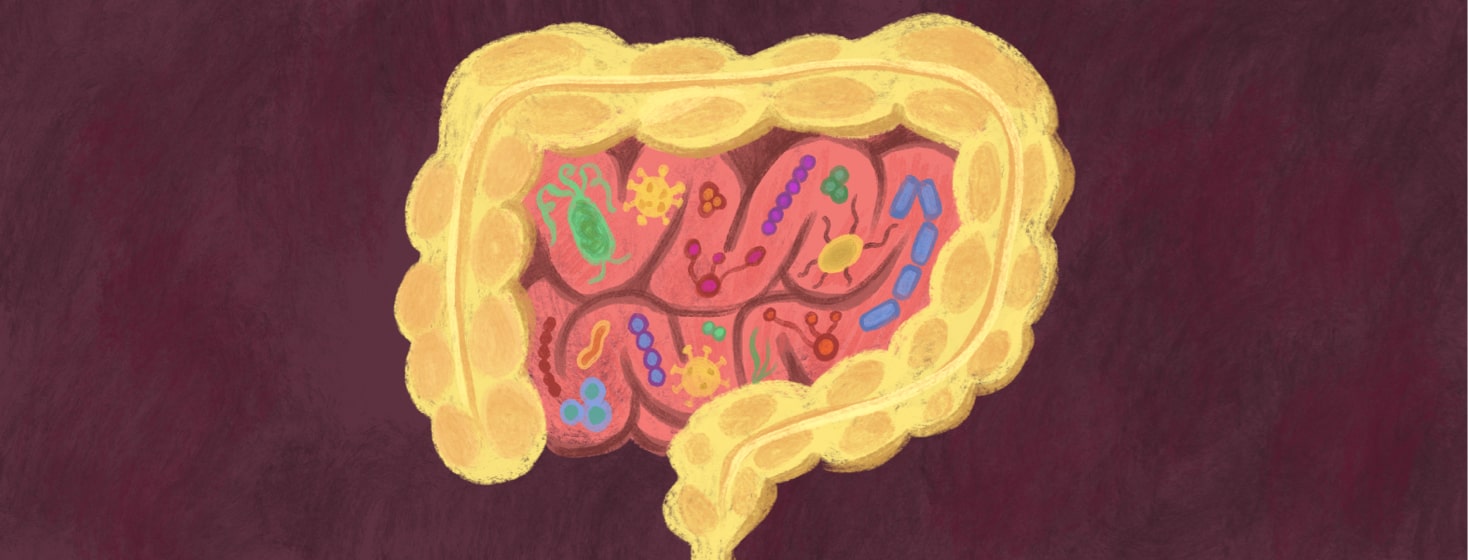Anti-fungal Diet and Irritable Bowel Syndrome
When your gut is healthy, your whole body is usually healthy. Studies show that your gut’s contents affect all your major systems. And fungus serves a key role in your gut.1-3
To understand this, consider what goes on within your large intestine (colon). Normally, 100 trillion bacteria, viruses, fungi, and parasites live in balance there. This tiny world is called the gut microbiome. There are good and bad citizens; the good ones police the bad. Many help each other, a situation called symbiosis.1,2,4
Some evidence shows that irritable bowel syndrome (IBS) may imbalance your microbiome’s population. This creates a condition called dysbiosis. During dysbiosis, your good bacteria decrease while fungi and bad bacteria increase. It is a chain reaction leading to many negative symptoms.1,2
Candida albicans (C. albicans), the most common gut fungus, multiplies as part of this reaction. Increasing amounts of C. albicans would normally trigger your immune system. In turn, your immune system would go after it and get rid of it. But C. albicans hides by forming a covering, or biofilm. It also releases 79 harmful substances, including uric acid, ammonia, and a nerve poison.1-5
Symptoms of C. albicans overgrowth in the gut include:2,3,5
- Bloating and gas
- Indigestion, nausea, and diarrhea
- Fatigue and brain fog
- Yeast infections and sinus infections
- Depression
- Joint pain
Some research shows that you can correct this situation by re-balancing the relationships between the organisms in your gut.1-4
What factors can unbalance my gut contents?
Before you can re-balance your gut microbiome, consider the situations that upset it. One key factor is what you put into your body. Your diet and chemicals like antibiotics, alcohol, and tobacco smoke all affect the population balance within your colon.1-3
The second way you can disrupt your gut contents is by what your body goes through. Your bathroom habits, lifestyle, and mental stress affect the microbiome population, too. If your waste passes too slowly, the contents can spread beyond your colon and cause harm. If your waste passes too quickly, the good bacteria cannot do their job.1,2
Further, an inactive lifestyle can trigger gut inflammation. Inflammation can lead to inflammatory bowel disease (IBD), IBS, and C. albicans overgrowth. Importantly, long-term mental stress also harms your gut. Any of these conditions may reduce your good bacteria, allowing excess fungal growth and dysbiosis.2,4,5
What does diet have to do with fungus growth in my gut?
As we mentioned, studies have shown that what you eat can greatly affect your gut health. On the one hand, research suggests that a diet high in sugar, fat, and processed foods may lead to dysbiosis. It can kick off that chain reaction of C. albicans overgrowth and the resulting negative effects.1-3, 5
On the other hand, animal studies also show that a diet high in anti-fungal foods may prevent and correct dysbiosis. Part of this includes reducing excessive C. albicans. Anti-fungal foods, when digested, lead to high short-chain fatty acid (SCFA) content in the gut. And that is good news. SCFAs:1-5
- Guard against inflammation, cancer, and fungal overgrowth
- Serve as antioxidants
- Help your body create energy from food
- Reduce appetite and help prevent overeating
- Balance insulin, preventing high blood sugar
What is included in an anti-fungal diet?
Typically, an anti-fungal diet focuses on reintroducing good bacteria into your digestive tract while also getting rid of extra fungi. Below is a basic list of things to include and avoid with an anti-fungal diet.1-3, 5
Foods to include
- Whole vegetables
- Low-sugar fruits
- Gluten-free whole grains like quinoa and brown rice
- Nuts and seeds
- Small amounts of chicken, fish, and eggs
- Fermented dairy and vegetables
Other components to include
- Fiber
- Antioxidants
- Vitamins D and E
- Omega-3 fatty acids
- Selenium
- Probiotics
Traditional medicine fungi-fighting foods and plants to include
- Garlic
- Lemongrass
- Coconut oil and olive oil
- Thyme
- Apple cider vinegar
- Fermented vegetables (kimchi, sauerkraut)
- Unprocessed yogurt
Substances to avoid
- Any form of sugar; on food labels, look out for anything that ends with -sugar, -ose, or -syrup
- Caffeine
- Alcohol
- Processed foods, fast foods
- Condiments (most)
- Tobacco smoke
Where should I start if I want to try an anti-fungal diet?
Before you start any new diet or lifestyle change, check with your doctor or healthcare provider. You can explain your symptoms and concerns about dysbiosis and gut fungi and get their feedback.
It is quite simple to include anti-fungal foods in your meals. You can check the internet for recipes and shopping tips. As you learn to adjust your eating and lifestyle, you will likely notice fewer IBS symptoms. And because a healthy gut means a healthy person, your overall well-being should increase.1-3

Join the conversation